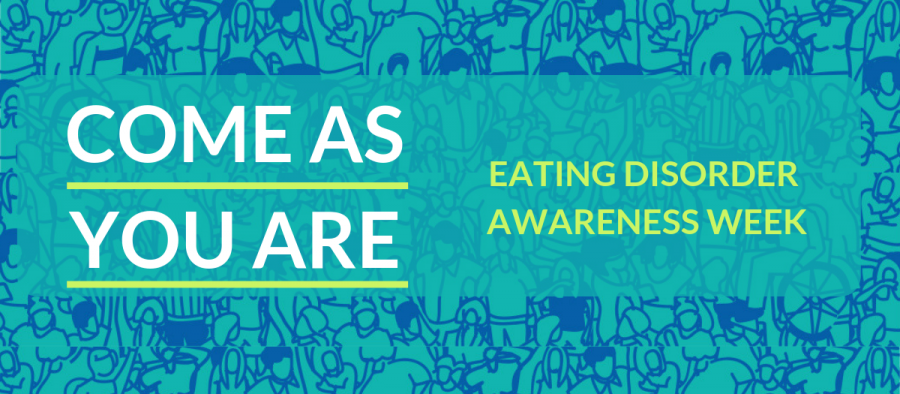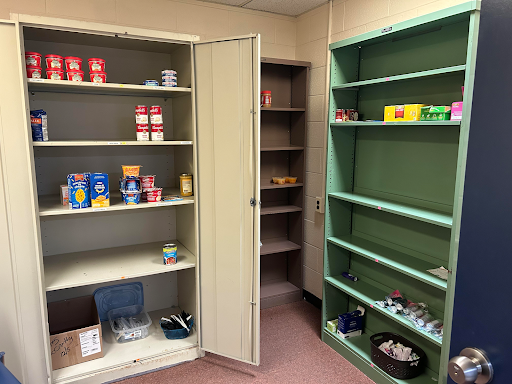The National Eating Disorders Association (NEDA) is celebrating this year’s NEDAwareness Week (#NEDAwareness) by inviting Every Body to Have a Seat at the Table.
NEDA is the largest nonprofit organization that is dedicated to individuals and families who have been affected by eating disorders. The goal of the NEDAwareness Week is to shed light on eating disorders by educating and providing resources to those in need.
“Eating disorders are serious but treatable mental and physical illnesses that can affect people of all genders, ages, races, religions, ethnicities, sexual orientations, body shapes and weights,” a statement from the NEDA website read. “National surveys estimate that 20 million women and 10 million men in America will have an eating disorder at some point in their lives.”
Proven data to show what it is exactly that causes eating disorders has not yet been found. It is suggested that eating disorders develop due to a range of biological, psychological and sociocultural factors. There are specific diagnostic criteria to diagnose each eating disorder. Warning signs and symptoms can result in severe health consequences and will require stages of recovery.
Utica College Counselor Amanda Leanard noted that amongst college students, bulimia and anorexia are the most common eating disorders.
“Individuals between the ages of 14-25 are at higher risk to develop eating disorders,” Leonard said. “The increased stress of academics, athletic pressures, peer acceptance, social relationships and identity are factors that may contribute to the college-age population being at risk.”
It is important that college students understand what these disorders are and look like, for themselves or their loved ones. Some common warning signs of an individual who may be suffering from an eating disorder include but are not limited to:
- Behaviors and attitudes highlighting dieting, weight loss, and control of food are primary concerns to the individual.
- Preoccupation with weight, food, calories, carbohydrates, fat grams and dieting.
- Restrictions on foods and intake amount; skipping meals or smaller portions.
- Discomfort eating around others or avoiding eating around others.
- Frequent dieting
- Excessive exercise
- Excessive concern with body appearance.
- Withdrawal from friends and activities once enjoyed.
- Extreme mood swings
Pressures to look perfect from the internet and social media also influence college students and young individuals. Social media platforms can be a toxic and dangerous place to spend time on even if you are not struggling with an eating disorder. These platforms are one big highlight reel for people to post their best moments, because who would want to show themselves at their worst?
Lexie Manion, NEDA supporter, has been sharing her personal experiences with eating disorders and mental health on social media since 2015. She shared her story with freshman health classes and was given the opportunity to write for the NEDA blog. Some of the blog requirements include not sharing before and after photos, as well as sharing numbers such as weight, size or caloric intake. To which, she created the hashtag #BoycottTheBefore.
#BoycottTheBefore is a campaign discouraging the sharing of “before” eating disorder recovery photos, which have been popularized over the years and in many cases depict a thinner, sometimes underweight, person in the first image along with the person in recovery in the second image. “Before” photos can trigger many people in the recovery community.

“I have had many people reach out to me saying that seeing such photos caused them to engage in eating disorder behaviors because people compare photos and feel as though they are ‘not sick enough’ or thin enough,’” Manion said. “I personally have compared my ‘before’ photo to others’ and it made me feel like my struggle didn’t matter as much, which is not true. #BoycottTheBefore focuses on the internal change rather than focusing on external change.”
While it is slowly getting better, there is still a stigma attached to eating disorders and mental health. Through sharing her story online, Manion has found a community that is full of inspiring people who are speaking on these topics and working towards ending the stigma. She encourages anyone who is struggling to surround themselves with a supportive community online or in person.
“It is so brave to reach out for help,” Manion said. “You are worth the help and deserve to feel better.”
Leanard also believes we have to continue to spread awareness to send the message that mental health is just as important and physical health in order to end the stigma.
At UC, the Health and Wellness Center provides mental health treatment and support to students. They are composed of licensed clinical professionals, nurses and contracted medical providers. They provide therapy and medical services. In addition, they provide psychoeducation and case management that can assist students in accessing proper treatment for eating disorders.
“When it comes to eating disorders, treatment requires a multidisciplinary team to provide integrated care as it is not only a mental health concern but a medical concern,” Leanard stated.
She would like anyone who is struggling with an ED or mental health that is too embarrassed or ashamed to reach out to know that the mental health professionals in the counseling center are not there to pass judgment.
“We are here to help you and provide the support needed to recover,” Leonard said. “Recovery is possible and we are in a safe place.”


















![President Todd Pfannestiel poses with Jeremy Thurston chairperson Board of Trustees [left] and former chairperson Robert Brvenik [right] after accepting the university's institutional charter.](https://uticatangerine.com/wp-content/uploads/2023/10/unnamed.jpeg)





















































































































